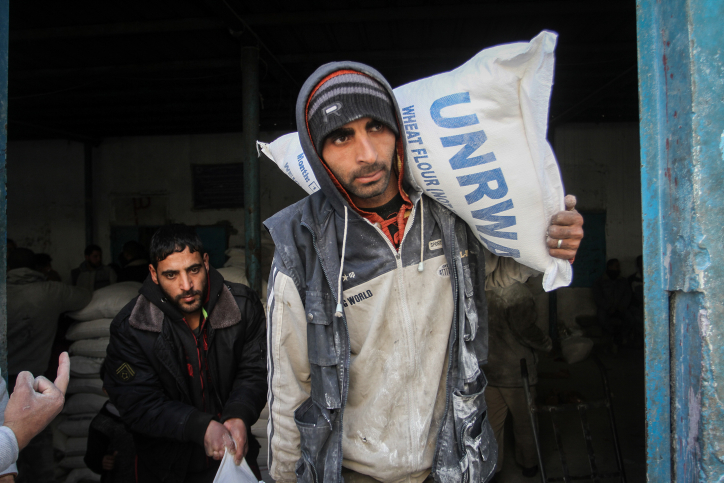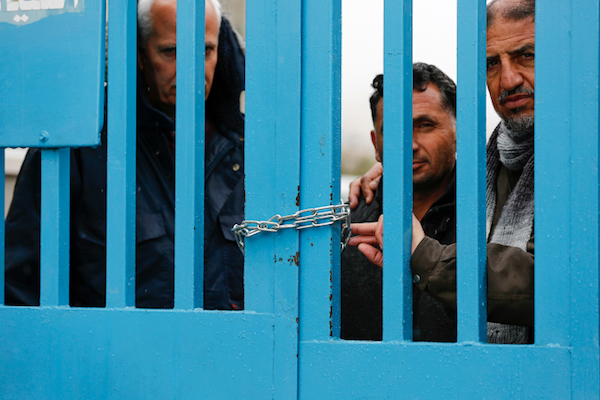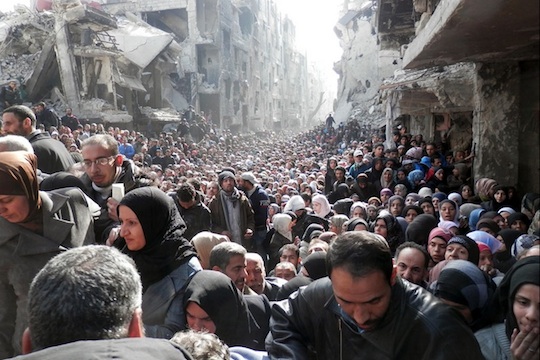As the U.S. slashes the Palestinian refugee agency’s budget, Netanyahu is urging it be abolished altogether. Some believe that shuttering UNRWA would somehow make the Palestinian refugee problem extinct. ‘Not true,’ says the agency’s director in Washington.

The Trump administration announced this week that it had cut by more than half its contribution to the UN Relief Works Agency for Palestinian refugees.
The agency provides life-saving assistance to 80 percent of the population in Gaza, food assistance for over a million Palestinians throughout the region, and schools for over half a million children.
Trump’s announcement of the funding cuts first came in a series of tweets in which he lamented getting “no appreciation or respect” from the Palestinian leadership, and its rejection of the his recognition of Jerusalem as Israel’s capital. “With the Palestinians no longer willing to talk peace, why should we make any of these massive future payments to them?” Trump tweeted in early January.
To better understand what is at stake and why some are taking advantage of this moment to advocate eradicating the agency altogether, +972 Magazine spoke with Elizabeth Campbell, Director of the UNRWA Representative Office in Washington. The interview has been edited for clarity.

Do we know yet when this decision would take effect, and how soon it would impact the agency?
The decision has already been made. UNRWA received $60 million from the United States and at this time has no information that there will be any additional funding forthcoming. It is more than an 80 percent cut over last year’s funding. It is already impacting the Agency in every possible way, since the United States was the largest donor. We are mobilized and responding by asking every citizen who cares about helping to keep 525,000 kids in school to donate to UNRWA.
Israel has taken the U.S. funding cuts as an opportunity to renew its demand that UNRWA be dismantled and UNHCR, the UN Refugee Agency, ultimately take responsibility for Palestinian refugees. Why does Israel want that, and what would the consequences be?
UNRWA is mandated by the majority of the UN’s member states to provide assistance and protection to five million refugees. To change this mandate, the members of the UN would need to revise UNRWA’s mandate. UNHCR is unable and unwilling to otherwise take responsibility for Palestine refugees. The two main reasons that people argue for this is because they think that UNHCR does not recognize refugee descendants and thus the Palestine refugee issue would become extinct. This is not true. UNHCR does recognize descendants of refugees under its protection. The second reason that people argue for this solution is that they believe that UNHCR can resettle Palestine refugees into third countries. UNHCR does resettle some refugees into third countries, but less than one percent of the total. It is unlikely that Palestine refugees would be resettled.
Many reports indicate that Gaza, in particular, could be hardest hit by these cuts. What are the implications for a population that is largely dependent on outside aid for its survival?
Yes, that is true. Gazans are heavily dependent on UNRWA as a source of employment and as a service provider. The Agency is the second largest employer, with a staff of about 13,000 refugees. UNRWA runs the majority of the schools in Gaza and provides life-saving assistance to 80 percent of the total population. If UNRWA closed in Gaza it would be devastating.

What about elsewhere in the Arab world?
More than one million refugees are dependent on UNRWA for food assistance. In 2016 our clinics absorbed 9 million visits. This is all in addition to the education program I mentioned earlier. If UNRWA fails to raise $500 million in 2018, these institutions and programs are at stake.
There have been several funding crises at UNRWA in recent years. How do you go about achieving long-term stability for an agency that, by definition, is meant to be temporary?
We are actively pursuing a wide variety of new funding mechanisms, including with the World Bank. We are asking new donors to step up and to contribute and existing donors to do more. We are also launching a campaign to highlight the needs of Palestine refugees and to ask citizens across the globe to donate now to address this existential crisis.
What next for UNRWA?
UNRWA is and will remain an independent humanitarian agency and it should not be held hostage to achieve any political objectives. UNRWA has educated over two million refugees, provided jobs for hundreds of thousands more, and offered access to basic health care. De-funding UNRWA will result in the collapse of these civilian institutions, uprooting vulnerable people, and punishing innocent children who seek only to secure an education for their future.

